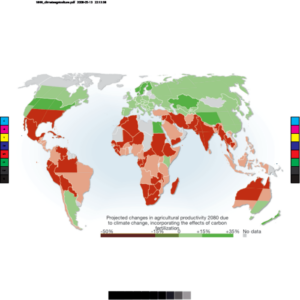The uneven effects of climate change
Climate change is often painted as a universal problem. Something that affects all of humanity, a global fight for the future of this world. This is a useful narrative to the extent that it may galvanize more people to spend money and time to solve the problem, but portraying it like this instead of showing the true picture of inequality associated with it may end up hurting us in the long run.
Firstly, I want to address how exactly it is unequal. For starters, everyone around the planet is feeling different effects. There are overall trends: nations inside the tropics are feeling the worst of it, getting more storms, more droughts, and more heat over all. It does not help that these are the poor countries, the ones least equipped to deal with these problems. On the other hand, countries further north are actually getting more livable as they heat (as an aside, I fully expect Canada to turn into a world superpower if climate change goes unmitigated.) Then there are random inequalities, like the gulf stream slowing down. This will make western european winters more akin to eastern European ones, as that added heat moved from the tropics by that current goes away.
As an example of this, I have included a map below that details the projected change in agricultural yield due to climate change by 2080. Most nations get quite a bit worse, but some far from the equator (which are the countries that are already fairly well off) will actually get more production with warmer weather and carbon fertilization, where the extra CO2 in the air helps plants grow.

This is clearly a problem for a couple of reasons. Firstly, nations like the United States and China, who emit the most greenhouse gasses and contribute the most to global warming stand to lose the least, at least directly, from its effects. As we saw at the recent conference in Egypt, the affluent nations of the world are not meeting emission targets. Maybe part of the reason is that they do not have as much of an incentive to do so. Secondly, it becomes clear why the poor nations of the world, such as those in sub-saharan africa, latin america, and southern asia, are requesting aid from intergovernmental bodies. Not only do they not have as many resources to deal with climate change, but because of their geographical position, they will have more to deal with because of climate change.
The uneven effects of greenhouse gas emission around the world is a seldom talked about, but critically important problem. Understanding its effects, especially on the motivations of governments around the world is crucial for understanding climate change, and helping fight to stop it.
Isaac Trost
- Categories: